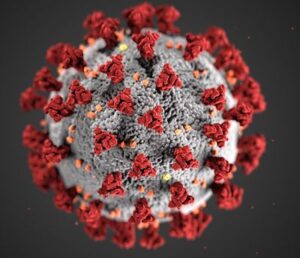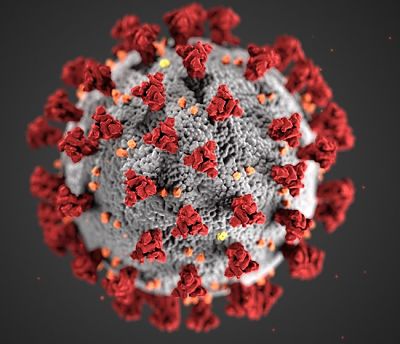[vc_row][vc_column][vc_column_text] Almost overnight, the novel coronavirus (or COVID-19) has become an unavoidable fact of life worldwide. In Illinois and across the United States, even the most mundane aspects of everyday existence are being reshaped dramatically as the nation seeks to stop the spread of this terrible virus. This includes the workplace, where employers are struggling to balance the demands of business with the needs of keeping employees safe. But regardless of whatever precautions are taken, many American workers will still likely contract COVID-19, including in the workplace. If this happens to you, you could understandably find yourself asking “Can I get workers’ compensation for a coronavirus infection?” GWC Injury Lawyers LLC takes a look at this new and pressing issue in Illinois workers’ compensation law.
Almost overnight, the novel coronavirus (or COVID-19) has become an unavoidable fact of life worldwide. In Illinois and across the United States, even the most mundane aspects of everyday existence are being reshaped dramatically as the nation seeks to stop the spread of this terrible virus. This includes the workplace, where employers are struggling to balance the demands of business with the needs of keeping employees safe. But regardless of whatever precautions are taken, many American workers will still likely contract COVID-19, including in the workplace. If this happens to you, you could understandably find yourself asking “Can I get workers’ compensation for a coronavirus infection?” GWC Injury Lawyers LLC takes a look at this new and pressing issue in Illinois workers’ compensation law.
Is Coronavirus Infection an “Occupational Disease”?
Because this outbreak is so recent, coronavirus infection is understandably not addressed by name in Illinois workers’ compensation law. There is also no discussion of whether infectious diseases are compensable in the Illinois Workers’ Compensation Act.
However, since the passage of the Illinois Occupational Disease Act (“Disease Act”) in 1951, Illinois has offered full workers’ compensation benefits for employees who contract a work-related illness, or “Occupational Disease.” An occupational disease is defined as:
…a disease arising out of and in the course of the employment or which has become aggravated and rendered disabling as a result of the exposure of the employment. Such aggravation shall arise out of a risk peculiar to or increased by the employment and not common to the general public. 820 ILCS 310/1(d)
Like other compensable injuries under Illinois workers’ compensation law, occupational diseases must arise out of and in the course of employment, meaning that it must occur because of the specific circumstances and duties of a worker’s job, circumstances and duties that would place that worker at a higher risk than someone not doing that job. As the Disease Act further clarifies:
A disease shall be deemed to arise out of the employment if there is apparent to the rational mind, upon consideration of all the circumstances, a causal connection between the conditions under which the work is performed and the occupational disease. The disease need not to have been foreseen or expected but after its contraction it must appear to have had its origin or aggravation in a risk connected with the employment and to have flowed from that source as a rational consequence. 820 ILCS 310/1(d)
To be eligible for workers’ compensation for a disease, it must be causally related to the workplace. This means that one event – performing the duties of a job in the workplace – directly caused or led to the other event – contracting the disease. To demonstrate that a disease is causally related to the workplace, an infected employee must show that the workplace caused it and that it resulted in a condition of “ill-being or disablement.” Establishing this connection generally requires an employee to obtain a medical opinion causally relating the disease at issue to exposure in the workplace.
Causal Connection Difficult to Prove
So, taking all of the above into account, would a coronavirus infection qualify as an occupational disease that would make an employee eligible for workers’ compensation benefits in Illinois? In most cases, the answer is “probably not” because of the difficulty of establishing a causal connection.
Based upon previous judicial decisions, the fact that the public at large is exposed to a particular disease generally lessens the chances that an individual claimant’s employment causes or aggravates that disease. As of March 26, 2020, there have been over 500,000 confirmed coronavirus infection cases worldwide, including more than 80,000 in the United States, and over 23,000 deaths, at least 1000 of which occurred domestically. There are 2,500 confirmed cases of coronavirus infection in Illinois alone, a number that continues to rise as more testing is conducted.
The novel coronavirus is clearly spreading rapidly, and this spread is unlikely to stop anytime soon, with health officials warning that a vaccine is a year or more away from becoming available. Given how widespread the coronavirus currently is, most workers are generally at no greater risk of exposure in their workplaces than the general public is at any number of locations. As such, most workers may face significant hurdles when trying to claim that a coronavirus infection was causally related to their work.
Certain Professions May Offer Exceptions
Certain professions, however, may offer exceptions to this rule – especially in light of Illinois Governor J.B. Pritzker’s “Executive Order in Response to COVID-19”, issued on March 20, 2020. In his order, Gov. Pritzker designated several categories of essential jobs, businesses and operations that are exempt, including “all first responders, emergency management personnel, law enforcement personnel, health care workers and others working to support Essential Businesses and Essential Government Functions.” In light of this order, any workers who are deemed essential and are required to continue to work could claim that they are at a greater risk of infection than the general public.
Medical professionals and emergency responders would be one notable example. Given the severity of the coronavirus outbreak, health workers dealing with infected patients are likely at greater risk of exposure to the virus than the average member of the public because dealing with infected patients is a specific duty of their job.
Construction workers and tradesmen and women who need to continue to perform their duties could also potentially claim that as essential workers, their jobs place them at a greater risk for infection than the general public. If a construction worker becomes infected due to an outbreak on a jobsite, for example, an argument could be made that it is more likely than not that their infection is causally related to their job.
To some extent, traveling employees like truck or delivery drivers for essential businesses, might also be more likely to establish a causal connection between their work and a coronavirus infection, depending on where they are required to travel for their jobs and whether it is more likely than not that they were infected during the course and scope of their employment.
Noting these possible exceptions, while employers will fight to deny coverage in these matters, GWC will continue its fight for our injured/sick clients in an effort to protect and secure all their rights in both workers’ compensation and common law cases, where appropriate. While we recognize that it is the injured worker’s burden to prove that it was more likely than not that they were infected during the course and scope of their employment, we stand ready to fight for those who have suffered serious effects of the coronavirus, whether they be first responders, healthcare providers, construction workers or others who are infected while working in essential businesses in accord with the Governor’s order.
Committed to Our Clients in Difficult Times
At GWC Injury Lawyers LLC, we know that these are difficult, even frightening times for all Americans. It is important that we work together to overcome the unique challenges presented by the coronavirus outbreak, just as our country has overcome so many challenges before. Rest assured, however, that our goal at GWC remains unchanged: to continue to be reliable, available, and responsive to the needs of all our clients. If you need help, contact GWC today to schedule a free, no-obligation consultation with one of our Chicago workers’ compensation lawyers. You can call our office at (312) 464-1234 or click here to chat with a representative 24/7.
[/vc_column_text][/vc_column][/vc_row]
<< BACK TO BLOG POSTS